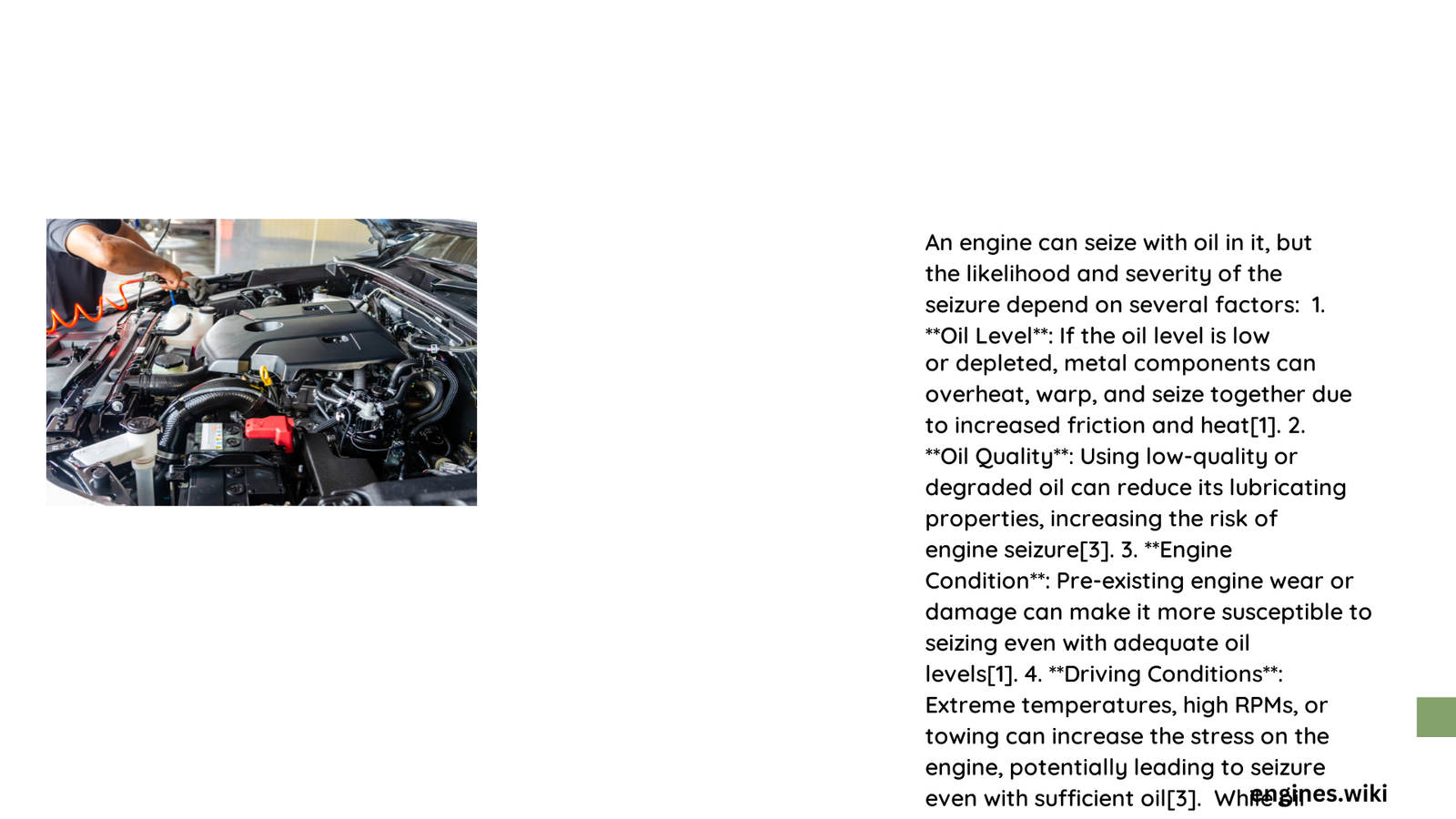Modern vehicle engines can experience catastrophic seizure even when oil is present, challenging the common assumption that oil alone prevents mechanical failure. The presence of oil does not guarantee proper lubrication or engine protection. Multiple complex factors can compromise oil’s effectiveness, leading to potential engine destruction, despite having what appears to be sufficient lubricant.
What Causes Engine Seizure When Oil Is Present?
Can Contaminated Oil Lead to Engine Failure?
Contaminated oil represents a significant risk to engine integrity. Several critical mechanisms can transform seemingly functional oil into a potential engine destruction agent:
Oil Contamination Pathways
- Fuel Dilution: Reduces oil viscosity
- Water Intrusion: Creates corrosive environments
- Coolant Mixture: Breaks down lubricating properties
- Particulate Accumulation: Increases internal friction
| Contamination Type | Risk Level | Potential Damage |
|---|---|---|
| Fuel Dilution | High | Viscosity Breakdown |
| Water Presence | Critical | Corrosion Acceleration |
| Coolant Mixture | Severe | Lubrication Failure |
| Particulate Buildup | Moderate | Increased Wear |
How Does Oil Viscosity Impact Engine Seizure?
Viscosity plays a crucial role in preventing engine seizure. When oil cannot maintain proper flow and lubrication characteristics, mechanical components experience increased friction and heat.
Key viscosity considerations include:
1. Manufacturer-recommended oil weight
2. Operating temperature ranges
3. Mechanical tolerances
4. Additive package degradation
What Mechanical Factors Contribute to Potential Seizure?
Several mechanical dynamics can compromise oil’s protective capabilities:
- Oil Pump Failure: Prevents proper circulation
- Blocked Oil Passages: Restricts lubricant flow
- Bearing Surface Degradation: Increases friction points
- Thermal Stress: Breaks down oil molecular structure
Can Regular Maintenance Prevent Engine Seizure?
Proactive maintenance represents the most effective strategy for preventing engine seizure:
Recommended Maintenance Protocols
- Perform regular oil analysis
- Monitor oil condition and viscosity
- Replace oil at manufacturer-recommended intervals
- Use high-quality lubricants
- Check for contamination signs
What Are the Warning Signs of Potential Engine Seizure?
Early detection can prevent catastrophic engine failure:
- Unusual engine noise
- Reduced performance
- Increased operating temperatures
- Visible metal particles in oil
- Grinding or knocking sounds
Technical Insights on Oil and Engine Protection

Professional mechanics understand that oil is more than a simple lubricant. It serves multiple complex functions:
– Heat dissipation
– Contaminant suspension
– Corrosion prevention
– Seal conditioning
Precision Oil Analysis Techniques
Modern diagnostic methods allow precise evaluation of oil’s condition:
– Spectrographic analysis
– Viscosity measurement
– Contamination detection
– Additive package assessment
Conclusion
While oil is essential for engine operation, its mere presence does not guarantee protection. Comprehensive understanding, regular maintenance, and proactive monitoring are crucial for preventing engine seizure.
